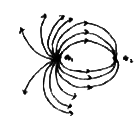A : Since matter cannot be concentrated at a point, therefore point charge is not possible.
R : An electron is a point charge.
If both Assertion & Reason are true and the reason is the correct explanation of the assertion, then mark (1).
If both Assertion & Reason are true but the reason is not the correct explanation of the assertion, then mark (2).
If Assertion is true statement but Reason is false, then mark (3).
If both Assertion and Reason are false statements, then mark (4).
The correct Answer is:C
To analyze the statements given in the question, we need to evaluate both the assertion (A) and the reason (R) separately.
Step 1: Understand the Assertion (A)
The assertion states: "Since matter cannot be concentrated at a point, therefore point charge is not possible."
- Explanation: A point charge is defined as a charge that is concentrated at a single point in space with no volume. However, in reality, matter has a finite volume and cannot be reduced to a point without leading to infinite density. Since density is defined as mass divided by volume, if we try to make the volume zero, the density would approach infinity, which is not physically possible. Therefore, this assertion is true.
Step 2: Understand the Reason (R)
The reason states: "An electron is a point charge."
- Explanation: An electron is often treated as a point charge in physics, especially in electrostatics, because it has a very small size compared to the distances involved in most physical situations. However, it is important to note that while we can model an electron as a point charge for calculations, it does not have a physical size in the classical sense. Electrons exhibit wave-particle duality, meaning they can behave like waves as well. Thus, while we can consider an electron as a point charge for certain theoretical purposes, it does not mean that it can be treated as such in all contexts. Therefore, this reason is false.
Conclusion
- The assertion is true: Matter cannot be concentrated at a point, hence point charges in a classical sense are not possible.
- The reason is false: While an electron can be treated as a point charge in certain contexts, it does not mean it is a point charge in all situations.
Final Answer
The correct conclusion is that the assertion is true, but the reason is false.
The assertion states: "Since matter cannot be concentrated at a point, therefore point charge is not possible."
The reason states: "An electron is a point charge."
- The assertion is true: Matter cannot be concentrated at a point, hence point charges in a classical sense are not possible.
- The reason is false: While an electron can be treated as a point charge in certain contexts, it does not mean it is a point charge in all situations.
The correct conclusion is that the assertion is true, but the reason is false.
Similar Questions
The potential at a point 0.1 m from an isolated point charge is + 100 volt. The nature of the point charge is
View SolutionNature of equipotential surface for a point charge is
View SolutionSTATEMENT-1 : A stationary electric charge produce electrostatic field and this field exterts electrostatic force on other charge.
STATEMENT-2: Theoritically electric field is found upto infinite distance from a point charge.
STATEMENT-3 : An electron is a point charge.View SolutionDraw E and V versus r on the same graph for a point charge.
View SolutionFigure shows lines of force for a system of two point charges. The possible choice for the charges is
 View Solution
View SolutionDerive an expression for electric field intensity at a point due to point charge.
View SolutionElectric lines of force about negative point charge are
View SolutionDetermine the potential at a point 0.50 m (i) from a+20μC potential charge (ii) from a−20μC point charge.
View SolutionTwo point charges of same magnitude and opposite sign are fixed at point a and B. A third small point charge is to be balanced at point P by the electrostatic force due to these two charges. The point P :
 View Solution
View SolutionA : A finite size charged body may behave like a point charge if it produces an inverse square electric field.
R : Two charged bodies may be considered as point charges if their distance of separation is very large compared to their dimensions.View Solution

